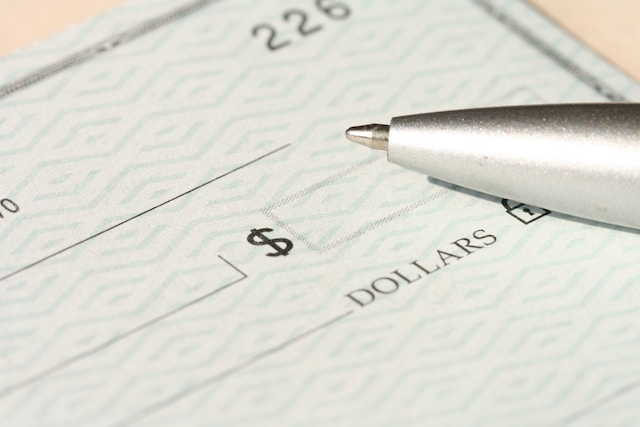Have you ever found yourself in a pinch, needing to cash a check, but your ID’s nowhere in sight? You might wonder if your birth certificate can come to the rescue. It’s a common dilemma, especially when you’re in a situation where traditional forms of identification aren’t available.
While your birth certificate is crucial, its role in financial transactions like cashing checks isn’t straightforward. The rules are often rigid in the financial world, and navigating them can be tricky. Let’s determine whether your birth certificate can be the key to unlocking your funds.
What documents are typically required to cash a check?
When you’re looking to cash a check, banks and financial institutions usually ask for specific types of identification to verify your identity. This ensures a secure transaction and deters fraud. Here’s what you’ll typically need:
- A government-issued photo ID. This could be a driver’s license, state ID, passport, or military ID.
- A secondary form of identification. In some cases, you might need to provide an additional document. This could include a social security card or a credit card.
Banks are exceptionally cautious and may require documents with your photograph attached, which adds an extra layer of security. Here’s a breakdown of potential ID requirements:
| Type of ID | Usually Accepted | Sometimes Accepted | Rarely Accepted |
|---|---|---|---|
| Driver’s License | Yes | ||
| State ID | Yes | ||
| Passport | Yes | ||
| Military ID | Yes | ||
| Social Security Card | Yes | ||
| Credit Card | Yes | ||
| Birth Certificate | Yes |
Remember, each institution has its policies; some may be stricter. Smaller banks or check-cashing services might be more flexible with the kinds of ID they accept, but they often charge higher fees for this convenience. Meanwhile, significant banks stick to a strict ID policy to protect against check fraud, which has become increasingly sophisticated.
Be prepared to provide your fingerprints as a part of the identification process at some locations. This measure has become more common to ensure further that you’re the rightful recipient of the funds from the check you’re attempting to cash.
Remember that guidelines can vary, so it’s a good idea to call ahead or check online for the specific requirements of the bank or service you plan to use. This step can save you the inconvenience of being turned away for not having the proper identification on hand.
Can a birth certificate be used as a form of identification to cash a check?
When you’re preparing to cash a check, you might wonder if your birth certificate can be an acceptable form of identification. The short answer is: not typically. Although a birth certificate is a vital legal document proving your identity and citizenship, it lacks some crucial elements required by most banks and check-cashing services.
Firstly, your birth certificate doesn’t include a photo, a key component financial institutions use to match your physical appearance with the name on the document. In contrast, a government-issued photo ID, like a driver’s license or passport, provides a quick visual confirmation of your identity for the bank teller or check cashing agent.
Secondly, a birth certificate doesn’t contain any security features inherent in photo IDs, which help determine the document’s authenticity and reduce fraud risk. These features can include holograms, magnetic strips, or special inks.
Here’s what you usually need:
- Primary ID: Government-issued photo ID (driver’s license, passport, state ID)
- Secondary ID (if required): Social Security card, credit card, or utility bill with your name and address
Remember, policies for identification may vary depending on where you’re trying to cash your check. It’s best to call ahead or look online to see what’s accepted by your chosen bank or check-cashing service. Some places might be more lenient and require you to get a birth certificate as part of supplementary documentation, especially if you’re a regular customer with existing records at the institution.
The limitations of using a birth certificate to cash a check
When cashing a check with a birth certificate, you’ll encounter several limitations that make it an unlikely option for most financial transactions. Unlike government-issued photo IDs, such as a driver’s license or passport, a birth certificate has no photograph or security features designed to prevent fraud. This absence makes it harder for the institution to verify your identity beyond doubt.
Financial institutions prioritize security, and due to the birth certificate’s lack of anti-fraud measures, it falls short of fulfilling the strict criteria banks require. Additionally, birth certificates do not typically include signatures, which are often necessary for comparison during check-cashing.
Here are a few reasons why a birth certificate may not be accepted:
- No photo for visual identity verification
- Absence of security features
- Lack of signature for authentication purposes
Some institutions may require secondary identifica
tion even when primary IDs are provided. In such cases, a birth certificate may serve as a form of secondary documentation but only as a supplement and cannot replace the primary photo ID. Always ensure you have valid, acceptable direct identification to avoid any inconvenience while engaging in financial activities.
Alternative options for cashing a check without ID
If you find yourself without a government-issued photo ID, don’t worry; you still have options to cash your check. Understanding these alternatives can be a lifesaver in a pinch. Your first stop might be the issuing bank. Often, the bank issuing the check can cash it for you after verifying its legitimacy and the account holder’s sufficient funds.
Check-cashing apps have become increasingly popular and offer a convenient workaround. With these apps, you typically take a picture of the check, and the funds are deposited into your account once approved. Some of the popular check-cashing apps include:
- Ingo Money
- PayPal
- Venmo
Retailers like Walmart or Kroger also provide check cashing services. These stores have their requirements but typically require less stringent ID verification. They might accept a birth certificate alongside other information to validate your identity.
Another strategy is to endorse the check to someone you trust who has an ID. Known as a third-party check, this involves signing the back of the check and having someone else deposit it into their account. However, both parties must agree to this arrangement, and the bank might require your presence during the transaction.
Trust is paramount when handling money matters. If you’re exploring these alternatives, always do so cautiously and ensure you abide by the rules of your financial institution or service. Remember the fees associated with alternative check-cashing options, as they vary significantly.
Conclusion
Frequently Asked Questions
Can I cash a check without an ID?
Yes, you can cash a check without an ID by visiting the issuing bank, as they may cash it based on their familiarity with the account holder.
What are check-cashing apps?
Check-cashing apps are mobile applications that allow users to cash checks through their smartphones by taking a picture of the check and following the app’s procedures.
Can I use retail stores to cash my check?
Yes, many retail stores like Walmart and Kroger offer check cashing services, often requiring you to present alternative forms of identification.
Is it possible to endorse a check to someone else to cash it?
Yes, you can endorse a check to someone with a valid ID; they can cash it on your behalf. Be sure to follow proper endorsement procedures.
Are there any fees associated with these check-cashing options?
Yes, depending on your bank, app, or retail service, fees may be associated with cashing your check. Always inquire about fees beforehand.



